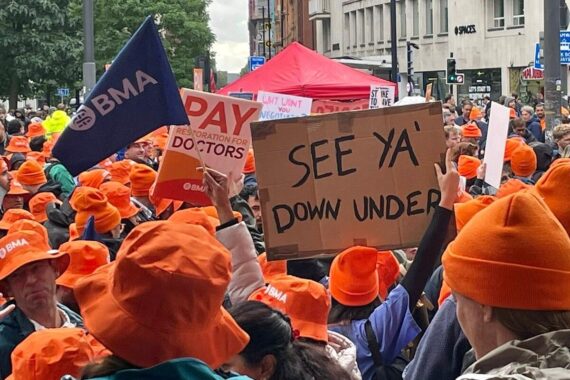GP registrars encouraged to take part in BMA industrial action this week

GP registrars have been encouraged to take part in the resident doctors strikes organised by the BMA across England this week.
The union published new guidance advising GP registrars that they should not see patients nor perform administrative work on strike days; it also encouraged them not to attend their practice on these days, as they are supernumerary.
It advised that striking registrars join local demonstrations outside hospitals rather than picketing outside their own practice, as the dispute is with the Government, not individual GP practices.
The strikes, which began on Friday last week and are set to end on Wednesday (30 July), should not affect the educational element of GP registrars’ rotas and practices have been advised by the BMA not to make changes to education and training aspects on the days of planned action.
According to data from the union, GP registrars, which make up the largest group of resident doctors, have not had pay parity with hospital resident doctors since 2016.
The BMA recognised there may be hesitation from GP ST3s to join strike action as they might not see a personal benefit to it, and could be wary about the impact industrial action could have on future career prospects.
But the union argued that the vast numbers of GP ST3s – which make up half of England’s GP registrars – were vital in proving ‘the strength of feeling amongst the profession’ by striking, and that there was a possibility that some may see a pay increase (depending on date of CCT) if the strikes were successful.
The advice said that GP registrars can still attend half day release (HDR) teaching days during the strike, but that if they choose to do so there may still be an impact on pay as employers may not accept ‘partial performance’.
The co-chairs of the BMA GP registrars committee encouraged registrars to take part in strike action and reminded them of their right to do so.
They pointed out that striking as a GP registrar can feel ‘uniquely complex’ and offered support and guidance on how to broach conversation with employers about industrial action.
Co-chair Dr Cheska Ball and interim co-chair Dr Oliver Salazar said: ‘The nature of general practice – working in small teams and building relationships with future employers can create added pressure and uncertainty.
‘We recognise that for many of you, decisions around striking are not purely legal or contractual − they are also relational. Informal job offers, future employment prospects, and one-to-one trainer relationships can all weigh heavily.’
The co-chairs suggested that those wishing to take part in strike action should engage in open communication with their practice, framing the decision as one of solidarity with the wider NHS workforce.
GPC England chair Dr Katie Bramall said that the strike action of GP is ‘part of a wider campaign to secure greater resources for general practice’.
According to figures from the BMA, the real-terms value of GP registrar pay has fallen by over 21% as it has not kept pace with inflation.
They are also seeking to address the Flexible Pay Premia deficit, arguing that it was set too low due to a lack of data.
Dr Bramall cited the stagnation of pay, GP unemployment crisis and student debts as key issues for GP registrars going through their specialty training today.
She said: ‘Their pay has stagnated over many years of sub-inflationary awards alongside that of sessional GPs and contractor GPs – and now the shocking GP unemployment crisis that many will face when they CCT due to many years of woeful workforce planning.
‘Many are saddled with six-figure student debts alongside punitive interest rates. Our committee members recall how by comparison so many of us benefitted from free on-site accommodation in our hospital years, undergraduate grants, and no tuition fees.
‘Life is very different for GP registrars progressing through their specialty training schemes today.’
Last week, the health secretary told the Review Body on Doctors’ and Dentists’ Remuneration that there will be ‘no additional funding’ for pay increases for doctors in the next financial year.
Related Articles
READERS' COMMENTS [2]
Please note, only GPs are permitted to add comments to articles














GP Trainees sed too little of patients as it is; striking will not help. The BMA is not your friend.
The number of GP registrars is so high that training schemes struggle to find placements for them, and once they qualify there are so many that they struggle to find jobs.
So it’s not clear what leverage they have to demand higher pay.
They might also regret forcing the government to spend money on higher trainee pay, which they will earn for a fraction of their career, at the possible expense of increasing GP funding which is going to affect them for decades to come.